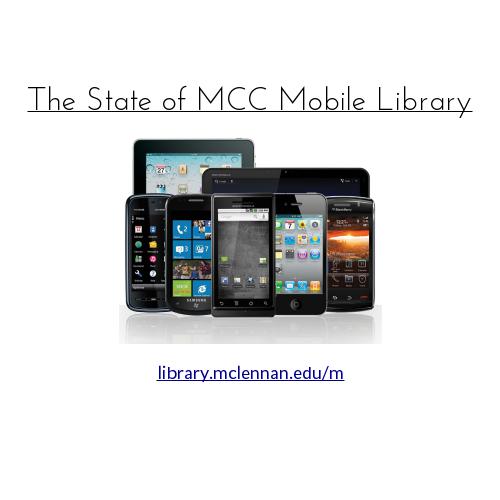Engaging
Business
Students and Faculty
at NMSU
(or Business LI for a solid ROI)
a presentation by David Irvin, MSIS
Navigation
About me
Education:
- BBA from Baylor University’s Hankamer School of Business. Management, Information Systems. Courses include: International business, macro- and micro-economics, finance, investment finance, financial & managerial accounting, and various information systems courses.
- MSIS from the University of North Texas' Toulouse School of Graduate Studies. ALA-accredited library school. Courses: Information access & retrieval, organization of information, government information & access, medical informatics, systems analysis & design, digital imaging, information architecture, indexing, digital libraries.
My Experience
Business experience:
-
2 years at a food company startup – Selling, managing, writing business proposals
- 4 years as a journalist (3 as a business journalist): topics included: The automotive industry, animal agriculture, economic development, REITs, and various startups.
Academic experience:
- 6 years in an academic library (4 in a technical service role, 2 in a electronic resources librarian role).
What we will cover today...
1. Define the question -
What makes a business student different?
What is business as a discipline?
2. Recommendations/ideas
3. Questions ???
Questions about today's goals?
Overheard on campus?
What is a business student anyway?
This may seem like a question with an obvious answer, but:
They are what they study: Business Core, companies, accountancy, etc.
They see the world in terms of: $$$
They speak a different language:


Example Reference exchange
Student:
What's the EBITDA of AAPL for Q4 2013? Can you get that in a 10-Q off the SEC's EDGAR for me?
Business librarian: Of course I can, what do I look like, a non-performing human resource over here?
Student:
Just make sure my ROI is solid.
What's the EBITDA of AAPL for Q4 2013? Can you get that in a 10-Q off the SEC's EDGAR for me?
Business librarian: Of course I can, what do I look like, a non-performing human resource over here?
Student:
Just make sure my ROI is solid.
Well, ok, but ...
Reference topics
RUSA (Reference and Users Services Association) Guidelines
1.1 Ensure the information services staff has the knowledge and preparation appropriate to meet the routine business information needs of the library’s clientele, and/or is trained in the appropriate referral techniques and made aware of reliable alternative resources for business information questions ...
Business reference and service section, 2013
Profile of a business student
What is business?

big ideas ...
We live in a time of unprecedented economic change, gains in information technology and the ability to make data-centric decisions.
Business touches almost every aspect of humanity and the planet.It is involved in how and what we eat, how we see, how we get medical attention, how we communicate.
It is where we encounter our greatest villains, and it also holds the keys to saving our most precious resources.
Business is an instrument for accomplishing all manner of things, and for some - like Elon Musk - it is a vehicle for bringing electric cars to the masses and (possibly) colonizing Mars.
open minds
Why Information Literacy Matters to Business Students/Faculty
We all experience information overload/fatigue in our personal lives. Businesses experience it as an inability to discover the information or data to make operational decisions.
- "... businesses are only able to make effective decisions when they have relevant and accurate information. Information is the fuel for effective decision making." (Booker, Detlor & Serenko, 2012, p. 2503)
Data-driven businesses -- which means all businesses of scale -- want to recruit individuals who are information literate.
Best Practice: Create spaces/services that business students want
1. Collaborative spaces
2. Trading desks?
3. Business database licenses
4. Others?
Example: SPSS (statistical analysis) software licensing. When we lost the licensing at McLennan, we lost the patrons.
Business Students' Perception of Library Service & Quality
"If campus libraries can allocate their limited resources to be more relevant to the current student population, specifically in the areas of staff professionalism, customer service, modern equipment and facilities while strategically expanding their on-campus and online holdings, then service quality for students will improve in the end and student users are more likely to utilize the library's offerings." (my emphasis)(p. 143)
"To address the increasing pressure to
meet library patrons' needs in the academic library, librarians should adopt a
consistent system that can reflect a quick, accurate view of library
services." (Hsu, Cummings & Wang, 2014, p. 138)
Not only with Return on Investment be greater when the student receives excellent instruction, reference help, and other kinds of library services, that student will also Return to the Library.
"To address the increasing pressure to meet library patrons' needs in the academic library, librarians should adopt a consistent system that can reflect a quick, accurate view of library services." (Hsu, Cummings & Wang, 2014, p. 138)
Ideas for a feedback system
-
Implement a survey applet on the IL classroom
computers.
-
Implement a survey applet in online courses.
-
Collaborate with faculty to discover ways to encourage feedback participation.
-
Follow up with an email to faculty members,
pointing out where the LI was critiqued, and ways we intend to improve in that
area.
- Others?
Additional research
Best practice: Collaborate with Faculty to Create Information Literacy opportunities
"Effective library instruction is not done in isolation. Collaborating with faculty on assignments and learning objectives can lead to successful library instruction sessions." (Strittmatter, 2011, p. 96)
Best practice: Engage business faculty meaningfully and often.
Engaging faculty
Co-develop research projects and keep up throughout the semester
Strittmatter's three-step Business LI plan
Best practice: Get LI early in the curriculum
Booker, Detlor & Serenko studied how information literacy instruction influences the adoption of online library resources by business students.
"… findings suggest that the ILI received by business students is only beneficial in reducing OLR anxiety and increasing OLR self-efficacy in the initial or early stages of OLR use. Results indicate that business students quickly reach a saturation point where more ILI contributes little, if anything, to reducing OLR anxiety or increasing OLR self-efficacy. After this saturation point, it is the independent, continuous use of OLR that creates a continued reduction in OLR anxiety and a continued increase in OLR self-efficacy." (p. 2516)
Why so early?
Outreach and IL is more effective when it is early in the process. In order to make the biggest impact in terms of driving students to the library resources and helping them succeed, we need to establish great relationships with the professors who instruct in the early business core, particularly those courses that have semester-ending or regular research projects.
In those IL courses we should let the students know that we will be there throughout their career for advice and research help, and give them materials that are easily understood and easily retained so as to drive student adoption of online library resources.
The 1, 2, 3 of Faculty Collaboration & Engagement
1. Identify key courses and faculty: Attend business faculty meetings to discover changes in curriculum or approach.
Personally visit key business faculty.
2. Engage faculty with specific research collaborations - (Implement a similarly structured three session IL course into the basic business courses, by contacting the faculty, working collaboratively with them to define the outcomes and come up with assignments where possible) - per Strittmatter.
3. Execute on the plan
Best Practice: Discover what they (business faculty) want:
Searching behaviors of TAMU business faculty:
Data intensive projects:
Wharton Data Research Services (47%), Library databases (28%), Company source (25%), Survey (25%)
Methods:
Scholarly literature (52%), Statistical modeling (50%), Survey (36%), Field work (21%)
Web sites:
Google Scholar (67%), Library databases (31%), Social Science Research Network (17%), Library Web site (17%) .
Collection development
as outreach
-
More face time/phone time
-
More trust
- More collaboration
- More meaningful relationships
-
More LI
- More library use
- More student success
Best Practice: Make sure the technology works
"Simplify the process of connecting remotely to library resources when it's technically possible. Improve instruction and personal assistance when t is not." (Markgraf & Erffmeyer, 2002, p. 112)
"Access to reference service will be improved when it is readily available during times that DE students tend to need it, such as evening and weekend hours. (Markgraf & Erffmeyer, 2002, p. 112)
Best Practice: Tune and retune online offerings
1. When you fill out your business database offerings each year, take a look at the products that have good online tutorials and link them back in the LibGuides.
2. Dispose of the old, useless, or untimely tutorials.
3. Develop new tutorials for those resources that do not have useful tutorials already.
4. Each semester, review that the LibGuides are appropriate, up to date, that they address the courses that are being offered that semester.
5. Make sure that links to outside sources are live, not broken.
6. Edit these at the template level as possible, to improve the ability to quickly develop new, accurate, and working LibGuides.
Best Practice: Create JIT LibGuides
Templates, Templates, Templates
1. It may be possible to structure the Business LibGuides to match the structure of the core business curriculum
2. Develop detailed, interchangeable, on-time deliverable LibGuides templates for specific course offerings
3. Set benchmarks to achive greater granularity each semester/year revision
NMSU Business School Programs
-
PGA Golf Management
-
Marketing
-
Management
-
International Business
-
Insurance Studies
-
Information Systems
-
General Business
-
Finance
-
Economics
-
Accountancy
References
- Booker, L. D., Detlor, B., & Serenko, A. (2012). Factors affecting the adoption of online library resources by business students. Journal Of The American Society For Information Science & Technology, 63(12), 2503-2520 18p. doi:10.1002/asi.22723
- Guidelines for business information response. (2013). Reference and User Services Association. The American Library Association. Retrieved from http://www.ala.org/rusa/resources/guidelines/business
- Hoppenfeld, J., & Smith, M. M. (2014). Information-seeking behaviors of business faculty. Journal Of Business & Finance Librarianship, 19(1), 1-14. doi:10.1080/08963568.2014.852906
- Hsu, Maxwell K.; Cummings, Richard G.; Wang, Stephen W. (2014). Business students' perception of university library service quality and satisfaction. Contemporary Issues in Education Research, v7 n2 p137-144 2014
- Khazan, O. "My Major, Myself." The Atlantic. Atlantic Media Company, 25 Jan. 2016. Web. 07 Apr. 2016.
- Markgraf, J. S., & Erffmeyer, R. C. (2002). Providing library service to off-campus business students: Access, resources and instruction. Journal Of Business & Finance Librarianship, 7(2/3), 99.
-
Strittmatter, C. (2012). Developing and assessing a library instruction module for a core business class. Journal Of Business & Finance Librarianship, 17(1), 95-105. doi:10.1080/08963568.2012.630645
Further reading
- Arguello, N. (2013). Secondary marketing research certificate: Library collaboration with the college of business and marketing faculty. Journal Of Business & Finance Librarianship, 18(4), 309-329. doi:10.1080/08963568.2013.825559
-
Bowers, C. M., Chew, B., Bowers, M. R., Ford,
C. E., Smith, C., & Herrington, C. (2009). Interdisciplinary synergy: A partnership between business and library faculty and its effects on students' information literacy. Journal Of Business & Finance Librarianship, 14(2),
110-127. doi:10.1080/08963560802362179
-
Campbell, D. K., & Cook, R. G. (2010). An experiential market research analysis: A partnership between teaching and library faculty. Journal Of Business & Finance Librarianship, 15(3/4),
171-178. doi:10.1080/08963568.2010.487433
-
Culley, J. D., Healy, D. F., & Cudd, K. G.
(1977). Business students and the university library: An overlooked element in
the business curriculum. Journal Of Academic Librarianship, 2(6), 293-296.
- Senior, H., Wu, K., Martin, D. M., & Mellinger, M. (2009). Three times a study: Business students and the library. Journal Of Business & Finance Librarianship, 14(3), 202-229. doi:10.1080/08963560802370867
Thank you!
you can reach me at dirvin79@gmail.com
Information Literacy defined

Operate your "self"
Information Literacy is about empowerment - as a college student and in your everyday life.
If you want to successfully operate your life, you need to know where you lack knowledge and how to get that knowledge.
- Becoming information literate allows you to become "self-reliant, self-directed, autonomous learners throughout" your life (Wolfe, 2015).

Information Literacy is about empowerment - as a college student and in your everyday life.
If you want to successfully operate your life, you need to know where you lack knowledge and how to get that knowledge.
- Becoming information literate allows you to become "self-reliant, self-directed, autonomous learners throughout" your life (Wolfe, 2015).

Operate your society
Society is changing at such a pace that it is impossible to know everything about any given field -- this is true in academics, business, politics, and culture.
So it is critically important to learn the skills of continual learning, or you will have trouble keeping up with changes occurring in society and your chosen academic field.

Overcome information overload
-
Marketing
-
Newsfeeds
- Search Engines
What's wrong with having more information?
- Usually that means - Your personal information for free online services.
- But it also means - Money (from advertisers) in exchange for information promotion.
- Question : How do you tell the difference?
A Path to Information Success
Knowing
Question: Do you know what you are looking for?
Knowing (cont.)
Here are the three key questions to answer:
-
What do you want to know? ___________________________________
-
What kind of information? _____________________________________
-
How much information? _______________________________________
Knowing (cont.)
Knowing (cont.)
Access
Question: Do you know where to look?
Access (cont.)
Here are the important questions to answer about access:
- How can I get this information? _________________________
- Choose your search terms: _____ & _____ & _____ & ______
- Choose the resources: ____________ & __________ & ________
Access (cont.)
Access (cont.)
Other Sample Research Topics
IL Course Citations
- "Introduction to Information Literacy." Association of College & Research Libraries, n.d. Web. 25 Jan. 2016. Retrieved from http://www.ala.org/acrl/issues/infolit/intro
- "The Standards: Step-by-Step." Association of College & Research Libraries, n.d. Web. 26 Jan. 2016. Retrieved from http://www.ala.org/acrl/issues/infolit/standards/steps
-
Wolfe, K. S. (2015). Emerging Information Literacy and Research- Method Competencies in Urban Community College Psychology Students. Community College Enterprise, 21(2), 93-99.
Lesson Review and Discussion
-
Importance of Information Literacy
-
Know your need
-
Get access
Engaging NMSU Business Students and Faculty (or Business LI for a solid ROI)
By dirvin79
Engaging NMSU Business Students and Faculty (or Business LI for a solid ROI)
Strategies for student and faculty engagement, presented April 8, 2016, at NMSU, by David Irvin
- 44




